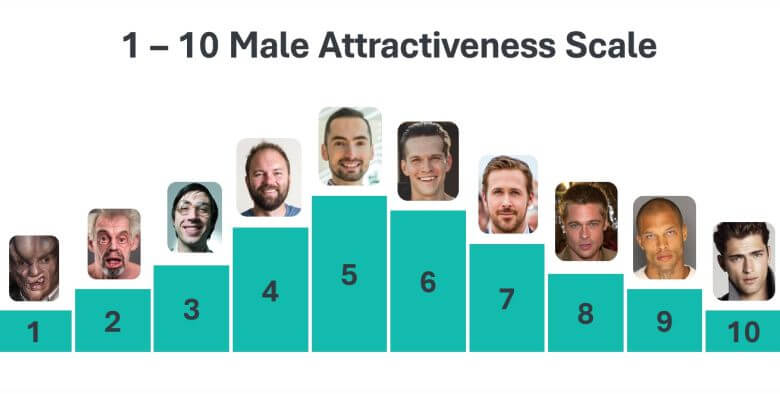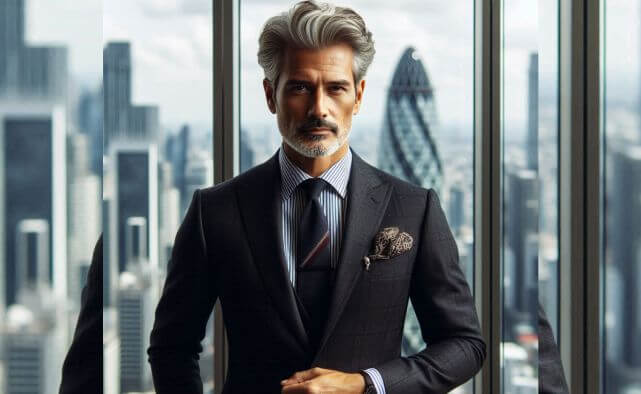Last updated on January 23rd, 2026 at 09:10 pm
Maintaining male attractiveness is a balance of physical, emotional, and social factors and here is how to achieve that.
While physical appearance plays a significant role, emotional and social factors are the pillars that contribute to a man’s overall attractiveness.
This blog post will explore the secrets to maintaining male attractiveness, highlighting the importance of confidence, body language, and emotional intelligence.
Key Takeaways
- A combination of physical traits, social intelligence, and emotional depth significantly impacts male attractiveness and appeal.
- Confidence promotes a man’s appeal, showcasing self-assurance and a positive attitude, which attracts women more than appearance alone.
- Emotional intelligence allows men to manage emotions, empathize, and build lasting connections, making them more attractive emotionally.
- Good body language, including eye contact and posture, communicates confidence and approachability, enhancing male attractiveness.
- Maintaining good grooming, fitness, and healthy lifestyle signals self-value, contributing significantly to male visual attractiveness.
You might want to pin the image below.

Understanding and Maintaining Male Attractiveness
Male attractiveness is the combining of many physical, social, and emotional factors to make a man appealing and desirable.
These factors may include physical features like facial symmetry, height, biceps, social factors like a sense of humor, social intelligence, and emotional intelligence, kindness, and more.
Let’s take a look at some factors that increase a man’s male attractiveness.
Suggested: Fashion Tips for Older Gentlemen
Types of Male Attractiveness
Male attractiveness covers various aspects of both physical and non-physical traits.
Physical Attractiveness
One prominent category is physical attractiveness, which often includes features such as facial symmetry, skin quality, body composition, and overall grooming.
Men who possess these characteristics are perceived as more appealing.
Research indicates that facial features, including jawline definition and eye shape, significantly contribute to the perception of attractiveness, highlighting the biological underpinnings that often influence attraction.
Charisma
Qualities such as charisma, confidence, and a well-developed sense of humor can significantly enhance a man’s attractiveness.
Charisma, in particular, is the ability to attract and charm others through conversation, social skills, and emotional intelligence.
This trait can overshadow conventional attractiveness, as individuals often find themselves drawn to those who can engage and connect on a personal level.
Personality
Another important aspect of male attractiveness is personality. Traits such as kindness, honesty, and ambition contribute to how men are viewed by others.
A man’s capacity for empathy and his overall demeanor in social settings can greatly influence perceptions of his attractiveness.
The Male Attractiveness Scale

The male attractiveness scale serves as a conceptual framework designed to quantify the varying levels of attractiveness among men.
This scale is based on several criteria, including physical appearance, social status, personality traits, and behavioral characteristics.
Researchers utilize this metric as a reference point in studies related to human attraction, which can help to understand the complex interplay of qualities that contribute to one’s perceived attractiveness.
At the core of the male attractiveness scale are empirical assessments that often include variables such as facial symmetry, body mass index (BMI), and grooming habits.
Studies have shown that individuals tend to prefer symmetrical features, which are often interpreted as indicators of genetic fitness.
Alongside physical attributes, social factors like dominance and confidence also play a significant role in how attractiveness is perceived.
The integration of these criteria allows for a holistic view of male attractiveness, moving beyond surface-level assessments.
Controversies with the Male Attractiveness Scale
Nonetheless, the application of the Male Attractiveness Scale is not without controversies.
Critics argue that such scales can promote unrealistic standards and may lack cultural sensitivity.
Different societies possess varying ideas about what constitutes attractiveness, rendering a universally applicable scale an unrealistic goal.
For instance, research has indicated that personal preferences can deviate significantly across cultures, thereby challenging the efficacy of a standardized measure.
Male Attractiveness Scale in Different Domains
In practice, the male attractiveness scale has found utility in various domains, including dating apps and social psychology experiments.
These applications aim to predict human attraction and behavior but often generate discussions regarding the implications of quantifying such a deeply personal attribute.
Despite its criticisms, the scale remains an important tool for researchers attempting to unravel the tangles of how attractive a male can be, and its influence on social dynamics.
The Peak Age of Male Attractiveness

Understanding the peak age of male attractiveness involves evaluating various research studies that highlight the age range when men are deemed most appealing, particularly from societal and psychological perspectives.
Numerous studies suggest that men between the ages of 30 and 40 often achieve their highest levels of attractiveness.
This phenomenon can be attributed to a combination of factors, primarily characterized by physical health, emotional maturity, and self-confidence, all of which are typically garnered through life experiences.
Physical Health
Physical health plays a central role in how attractive a male can be. During their thirties and early forties, many men experience peak physical conditioning often associated with regular exercise and a generally health-conscious lifestyle.
This physical vitality often enhances their desirability within social and romantic contexts.
Emotional Maturity
Alongside physical health, emotional maturity also evolves with age, contributing significantly to perceptions of attractiveness.
Mature men often exhibit higher emotional intelligence and better communication skills, making them more appealing to potential partners who value these traits.
Confidence
Moreover, confidence levels tend to increase as men age, which is another determinant of attractiveness.
Research has consistently shown a correlation between confidence and perceived attractiveness.
Men in the peak age bracket typically possess greater self-assurance forged from personal and professional life experiences, underlining their evolving identities.
This self-assured demeanor often translates into social situations, making them appear more attractive to others.
Perceptions Surrounding Age and Attractiveness
Public perceptions surrounding age and attractiveness also add another angle to the discussion.
Societal norms can create varying images of what constitutes attractiveness at different ages.
Older men are sometimes viewed as more distinguished or sophisticated, whereas younger males may be associated with vigor and vitality.
Ultimately, the peak age of male attractiveness reflects an interplay of physical attributes, psychological development, and societal expectations, revealing that attractiveness is both a personal and cultural construct.
Calculating and Charting Male Attractiveness
Male attractiveness has long perplexed researchers and individuals alike, sparking studies aimed at quantifying this abstract concept.
Recent approaches in social science have employed various methodologies to calculate and chart male attractiveness, relying on attractiveness calculators and analytical charts that reflect average desirability across distinct age groups.
These tools serve as a way to systematically analyze perceptions and biases surrounding male attractiveness within different populations.
How it Works
Attractiveness calculators often utilize frameworks established in psychological studies that assess traits commonly associated with desirability, such as physical appearance, social status, and personality characteristics.
For instance, many calculators utilize peer evaluations, where individuals rate the attractiveness of male subjects based on established criteria.
In aggregate, these ratings can be converted into a numerical score that represents relative attractiveness, which can provide insight into societal preferences and trends.
Moreover, studies surveying demographics often compile charts that break down the average attractiveness of males by age and geographic location.
Through statistical analysis, researchers can identify patterns, revealing that perceptions of attractiveness can vary significantly across different cultural contexts.
For example, men in their late twenties to early thirties are often rated as most attractive, which can be linked to societal standards of maturity and stability at that life stage.
By quantifying these preferences, researchers not only provide a clearer understanding of male attractiveness but also highlight potential shifts in societal norms.
Factors that Increase a Man’s Male Attractiveness

Confidence: The Foundation of Attractiveness
Confidence is the base of attractiveness. It is the quality that sets a man apart irrespective of other factors and makes him more appealing to women.
Confidence is not just about physical appearance; it is about how a man carries himself, his posture, and his demeanor.
When a man is confident, he exudes a sense of self-assurance that is attractive to women.
This confidence can be developed through self-improvement, self-care, and a positive attitude.
Body Language: The Nonverbal Cues
Body language is another important factor in how attractive a male can be.
It is the nonverbal communication that sends signals to others about a man’s intentions, emotions, and personality.
Of course, more is communicated through body language than spoken words.
Good body language includes maintaining eye contact, standing up straight, and using open and relaxed gestures.
These nonverbal cues can make a man appear more confident, friendly, and approachable.
Related: The Man Every Woman Desires
Emotional Intelligence: The Key to Emotional Attractiveness
Yes! Emotional attractiveness is a thing.
Emotional intelligence is the ability to recognize and manage your emotions, empathize with others and sustain good relationships.
It is irreplaceable in the toolbox of male attractiveness because it shows that you are capable of deep emotional connections and can handle the turbulence of relationships.
Emotional intelligence can be developed through self-awareness, self-regulation, and effective communication.
Physical Appearance: The Visual Attractiveness
Now this is the most popular factor in how attractive a male can be. Physical appearance is what everybody sees. Your hair, hygiene, and more.
Physical attractiveness can be improved through proper grooming, exercise, and a healthy lifestyle.
A man who takes care of his physical appearance sends a signal that he values himself and is willing to put in the effort to look his best.
Clothing and Style: The Visual Cues
Clothing and style are important visual cues that can improve your attractiveness as a man.
Dressing well and appropriately for the occasion can make you appear more put together, boosting your and confidence.
However, it is important to do it modestly so you don’t send the signal of trying hard to impress.
Social Skills: The Ability to Connect
Any man who wants to be masculinely attractive should have to develop the ability to connect socially.
Social skills are critical for how attractive a man is. They involve the ability to connect with others, build rapport, and communicate effectively.
Good social skills can be developed through practice, self-awareness, and a willingness to learn from others.
Emotional Expression: The Key to Emotional Connection
Emotional expression is the ability to express your emotions healthily and constructively irrespective of the situation.
Emotional expression is of course, vital for any relationship. Being able to express anger, excitement, love, sadness and other emotions appropriately is the base for respectful relationships.
Authenticity: The Foundation for Being Likable
Male attractiveness rests on being authentic. This means being yourself, and not trying to step in another man’s shoes.
It is the quality that sets you apart from others and makes women desire you more.
To be authentic, you have to embrace your flaws, recognize your strengths and be vulnerable.
This helps you embrace your unique personality, values, and style that can only be yours.
Frequently Asked Questions
What makes a male attractive?
Confidence, emotional intelligence, good hygiene, and a well-groomed appearance are key factors in how attractive a male is.
Which male body type is attractive?
A lean, athletic body with a balanced muscle tone is often considered the most attractive male body type.
What makes a male face attractive?
Symmetry, defined jawline, strong brow, and clear skin contribute to a more universally attractive male face.
What is peak male attractiveness?
Peak male attractiveness combines physical fitness, self-assuredness, emotional maturity, and personal style, typically achieved in the late 20s to 30s.
Final Words from Gentsways
Maintaining male attractiveness is sustaining a balance of physical, emotional, and social factors.
While physical appearance takes the front row, emotional and social factors increase a man’s male attractiveness through confidence, body language, emotional intelligence, and emotional expression.
By focusing on these aspects, you can improve your attractiveness and build a strong relationship with others.
References:
- https://goodguys2greatmen.com/how-to-measure-your-attractiveness-as-a-man/
- https://www.physicsforums.com/threads/the-secret-on-how-men-can-attract-women.672533/
Pyo Merez is a men’s lifestyle enthusiast and writer about the gentleman’s place and impact on society. Raised by a distinguished gentleman dad, he offers unique insights into how the mind of a gentleman works and how societal norms shape gentlemen’s identity and vice versa.
Through his insightful articles, Pyo taps into the depths of gentleman culture to provide perspectives on etiquette and manners in modern society.

